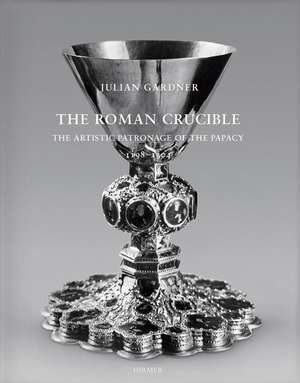The Roman Crucible: The Artistic Patronage of the Papacy 1198 - 1304
Autor Julian Gardneren Limba Engleză Hardback – 14 aug 2014
Throughout the thirteenth century, the Roman Catholic papacy played a predominant role in the patronage of the arts, importing works from all corners of Europe to the Latium region. With The Roman Crucible, Julian Gardner offers a comprehensive and carefully researched overview of the role of the papacy in artistic patronage and the enormous impact of its program of acquisition in the rise of the Latium region as an important center for European art.
In addition to tracing the history of commissions approved by the church’s governing body, the Curia, Gardner’s research scrutinizes the complex relationships between artists and popes, cardinals, and other members of the church, with detailed accounts of individual’s stylistic and iconographic peculiarities. Gardner demonstrates how, through these interactions, Rome and the neighboring papal summer residences of Anagni, Orvieto, and Viterbo emerged as some of the most innovative artistic centers in Europe and melting pots for various artistic styles and techniques.
In addition to tracing the history of commissions approved by the church’s governing body, the Curia, Gardner’s research scrutinizes the complex relationships between artists and popes, cardinals, and other members of the church, with detailed accounts of individual’s stylistic and iconographic peculiarities. Gardner demonstrates how, through these interactions, Rome and the neighboring papal summer residences of Anagni, Orvieto, and Viterbo emerged as some of the most innovative artistic centers in Europe and melting pots for various artistic styles and techniques.
Preț: 898.57 lei
Preț vechi: 987.44 lei
-9% Nou
Puncte Express: 1348
Preț estimativ în valută:
171.94€ • 179.89$ • 142.83£
171.94€ • 179.89$ • 142.83£
Carte indisponibilă temporar
Doresc să fiu notificat când acest titlu va fi disponibil:
Se trimite...
Preluare comenzi: 021 569.72.76
Specificații
ISBN-13: 9783777423852
ISBN-10: 3777423858
Pagini: 520
Ilustrații: 393 halftones
Dimensiuni: 222 x 298 x 43 mm
Greutate: 3.27 kg
Editura: Hirmer Publishers
Colecția Hirmer Publishers
ISBN-10: 3777423858
Pagini: 520
Ilustrații: 393 halftones
Dimensiuni: 222 x 298 x 43 mm
Greutate: 3.27 kg
Editura: Hirmer Publishers
Colecția Hirmer Publishers
Notă biografică
Julian Gardner is a researcher in medieval studies and the history of art. He completed research for The Roman Crucible as a distinguished visiting professor in medieval studies at the University of California, Berkeley, and a research professor at the Bibliotheca Hertziana of the Max Planck Institute of Art History, Rome.
Cuprins
Acknowledgements
1. The Preconditions of Patronage
2. The Curia in the Thirteenth Century
Popes as Patrons
Innocent III
Honorius III
Innocent IV
Nicholas III
Nicholas IV
Boniface VIII
Some Thirteenth-Century Cardinals as Patrons
Raniero Capocci
John of Toledo
Ottobuono Fieschi
Matteo d’Acquasparta OFM
Giacomo Caetani Stefaneschi
3. The Earthly Frame: Architecture in Rome
4. Novus Ordo: The New Architectural Style in Rome and Central Italy
5. French Patrons and Italian Art in the Thirteenth Century
6. The Revival of Monumental Sculpture in Rome
7. Submerged Evidence: Texts and Wreckage
8. Roman Readers
9. English Embroiderers
10. Mosaic and Painting in Rome 1198-1276: Innocent III to Gregory X
11. Pope Nicholas III and the Birth of Modern Painting in Rome
12. The Final Flowering: Roman Painting before Avignon
13. Other Romes: The Hill-Stations
14. Romans and Greeks: The Relations of the Papacy and Byzantium During the Thirteenth Century
15. Onera Romanorum
16. Home Thoughts from Abroad
17. Conclusion
Postscript
Appendix
1. The Papacy and Cardinalate 1198-1304
2. Late Twelfth- and Thirteenth-Century Cardinals’ Seals
Bibliography and Abbreviations
Index
1. Names
2. Places
3. Objects
1. The Preconditions of Patronage
2. The Curia in the Thirteenth Century
Popes as Patrons
Innocent III
Honorius III
Innocent IV
Nicholas III
Nicholas IV
Boniface VIII
Some Thirteenth-Century Cardinals as Patrons
Raniero Capocci
John of Toledo
Ottobuono Fieschi
Matteo d’Acquasparta OFM
Giacomo Caetani Stefaneschi
3. The Earthly Frame: Architecture in Rome
4. Novus Ordo: The New Architectural Style in Rome and Central Italy
5. French Patrons and Italian Art in the Thirteenth Century
6. The Revival of Monumental Sculpture in Rome
7. Submerged Evidence: Texts and Wreckage
8. Roman Readers
9. English Embroiderers
10. Mosaic and Painting in Rome 1198-1276: Innocent III to Gregory X
11. Pope Nicholas III and the Birth of Modern Painting in Rome
12. The Final Flowering: Roman Painting before Avignon
13. Other Romes: The Hill-Stations
14. Romans and Greeks: The Relations of the Papacy and Byzantium During the Thirteenth Century
15. Onera Romanorum
16. Home Thoughts from Abroad
17. Conclusion
Postscript
Appendix
1. The Papacy and Cardinalate 1198-1304
2. Late Twelfth- and Thirteenth-Century Cardinals’ Seals
Bibliography and Abbreviations
Index
1. Names
2. Places
3. Objects
Recenzii
“Gardner is an authority on the art and architecture of Rome between the pontificates of Popes Innocent III (1198–1216) and Benedict XI (1303–04), making this volume a welcome addition to the literature on the subject. There is a particularly interesting overview of surviving personal seals, small privately commissioned works, which not only indicate the artistic taste of their patrons and the varying styles of the time but also provide a well-dated body of evidence, which can be used in some instances to further one’s understanding of more monumental works of art and architecture.”
